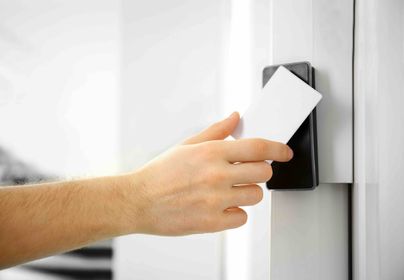Why do organizations and businesses still use key card based access control? We all forget our cards: we leave them at home, in our car, at our office desk when we go for lunch, and so on. In fact, keys and key cards are people’s second-most forgotten item. Every lost card incurs a cost. And during COVID, employees are hesitant to use loaner cards that have been touched by other staff.
You know what nobody ever leaves behind or forgets? Because their whole life is on it? Their mobile phone.
That’s just one reason why mobile access control is superior to other methods. Read on for the 10 reasons why mobile access control will replace badges and key cards as the more convenient solution.
- 1. Security
- 2. Prevalence of Smartphones
- 3. Convenient
- 4. Cost Effective
- 5. User Experience
- 6. Immediately Update Access Permisions
- 7. Easy Integrations
- 8. Intuitive
- 9. Remote Management
- 10. Browser Interface
Suggested Posts:
- Guide to Mobile Access Control
- Door Access Control: A Complete Guide
- Access Control Solutions: How to Choose One
- Cell Phone Gate Control: 7 Essential Tips for Implementing Mobile Access
1. Security
Mobile credentials are much more secure than key cards, which can be cloned with $20 devices on Amazon.
2. Prevalence of Smartphones
Almost every adult carries a smartphone. Ninety-three percent of the entire U.S. population uses a smartphone. For the few employees without a smartphone, alternate forms of access like facial recognition access can be used. Either method is touchless and hygienic.
3. Convenient
Administrators can grant mobile access to any user remotely. No physical handoff of a key card is necessary. That’s both more convenient and more hygienic.
4. Cost Effective
Savings from not having to print new cards. A recent study shows that 19 percent of college students lose their access/ID cards every year. And when organizational policy requires users to pay for their lost card, it engenders resentment and even clever subterfuges to avoid having to purchase a new card.
5. User Experience
People rarely forget their cell phone, but people often loose or forget badges and key cards. Employees visiting other offices don’t have to email ahead to get access credentials, then pick up a physical card, which requires a person-to-person handoff. With mobile credentials you can remotely grant access to visiting staff and have them download an app to gain easy access. This streamlines interoffice travel and reduces a major pain point with key card based systems.
6. Immediately Update Access Permisions
Administrators can revoke a mobile credential remotely and instantly when a former tenant or employee leaves the building. Another reason why mobile credentials are easily revoked is because most systems use cloud-based access control that can be managed from anywhere. By contrast key card systems tend to run on a single computer inside the building, which requires someone to be physically on site to revoke credentials. It’s not just revocation.
7. Easy Integrations
Mobile access control systems integrate into HR systems and single sign-on systems. When an employee is entered or removed from the HR database, access permissions automatically get added or revoked. This reduces the overall operational cost for companies and building management, while increasing safety and ensuring physical security compliance
8. Intuitive
Windows-based on-premise key card systems require well-trained staff who know how to enroll users, print cards, change permissions, and so on. Mobile systems eliminate that administrative burden and overhead. Mobile systems are designed to be intuitive and easy to use.
9. Remote Management
Who hasn’t been frustrated by a non-functioning access control card, especially when no admin staff are present to assist? Some poor IT staffer has to come to the office to let the employee in. With mobile access, administrators can remotely grant access to any door.
10. Browser Interface
All features of mobile access control systems can be managed from anywhere via a browser interface. This offers convenience for office, facility, and property managers.




